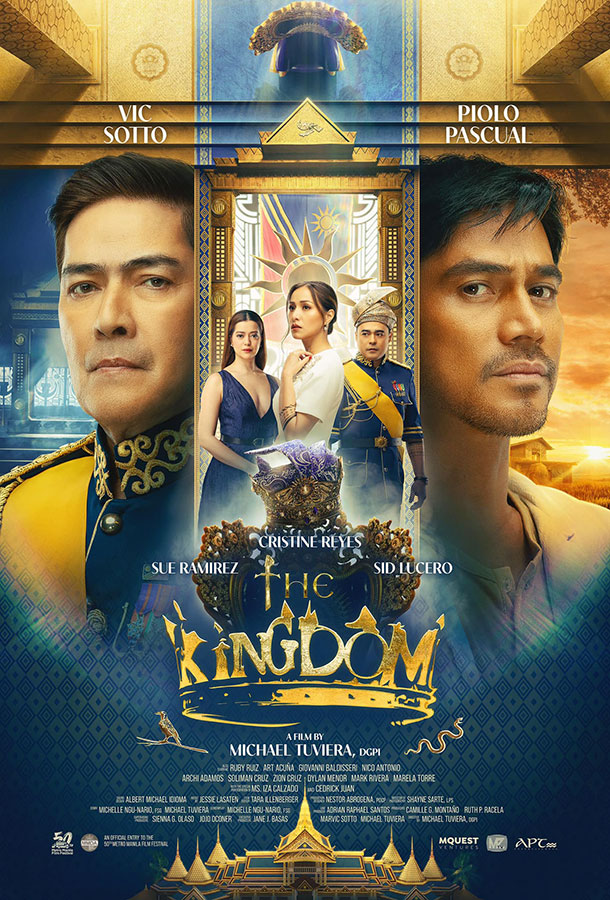By Edg Adrian A. Eva, Reporter
 Movie Review
Movie Review
The Kingdom
Directed by Mike Tuviera
Produced by MQuest Ventures, Inc., M-ZET TV Productions, and APT Entertainment, Inc.
(This review includes marked spoilers.)
WHAT IF the Philippines was never colonized?
This question has lingered in the minds of many Filipinos fascinated by history, myself included. The film The Kingdom takes this thought-provoking premise and brings it to life. Set in an alternative world, it reimagines the Philippines as the Kingdom of Kalayaan — a monarchy and one of the few nations that remain free from foreign colonization.
The film establishes the Kingdom of Kalayaan as a formidable stronghold, reflecting an aspiration for how the Philippines might have protected its territories if history had taken a different path, as shown in the opening scenes of the movie.
With its nuanced take on historical fiction, The Kingdom’s producers made unexpected casting choices with Vic Sotto as Lakan Makisig, in a departure from his usual fantasy and comedy roles. Piolo Pascual also shines as Sulo, an outcast farmer, showcasing his acting prowess following his performance in Mallari.
Lakan Makisig faces a difficult decision in selecting a successor from among his three children: Dayang Matimyas and Dayang Lualhati, portrayed by Cristine Reyes and Sue Ramirez, and Magat Bagwis, played by Sid Lucero. Meanwhile, Sulo, despite his anger toward the monarchy, becomes a crucial figure in determining the kingdom’s fate.
The concept of The Kingdom is ambitious, requiring a large-scale production to effectively present an alternative version of the Philippines. The film successfully incorporates Filipino beliefs and traditional attire, highlighting how they shape the nation’s identity. Notable moments include the royal wedding of Dayang Lualhati to a Thai prince, and — spoiler alert! — the Boat Burial of Lakan Makisig following his battle with Sulo, a fight he cannot refuse due to old customs.
As mentioned, the concept of creating an alternative version of the Philippines is ambitious, but it misses the opportunity to depict a reimagined Filipino community or city, which makes it difficult for the audience to fully immerse themselves in this alternate reality. Aside from the CGI exterior of the palace, the rest of the sets are filmed in recognizable locations around Metro Manila.
The story is ambitious as it explores various plotlines, such as the lives of Lakan Makisig’s children, Sulo’s banishment, and Dayang Lualhati’s kidnapping and return. However, dealing with so many plots compromises character development, especially that of Magat Bagwis. (Spoiler alert!) Despite being set up as a key figure and next in line for the throne, his abrupt death during peace talks with the separatist group Tiwalag leaves him with no significant highlights, despite his prominent role on paper.
This leads me to conclude that The Kingdom could work better as a 10-episode series, rather than just a two-hour film. The concept would be more effective in bite-sized installments. (Spoiler alert!) A key example is the sudden revelation of Dayang Matimyas as the mastermind behind her sister’s kidnapping and the plot to overthrow the king. The twist feels abrupt. Also, her motives would have been more powerful if conveyed through visual representations, like flashbacks, rather than just a simple conversation with her father.
The highlight of The Kingdom lies in its impressive fight scenes. It’s worth noting that Vic Sotto, at the age of 70, and Piolo Pascual, 47, both deliver action-packed sequences that go beyond the typical fight scenes, with each grounded in their characters’ personal motivations.
Their prison scene is another standout, highlighting the contrast between the heavy responsibilities of wearing a crown and the burdens of being an outcast. The two actors’ emotions powerfully show that their characters carry weight, whether it’s the pressure of ruling a kingdom or the struggle of living in poverty, and how society often forces individuals to bear these burdens without choice.
Overall, the film’s director Mike Tuviera effectively immerses the audience in an uncolonized Philippines. While the film has its flaws, it powerfully highlights that corruption, poverty, and inequality can persist, regardless of the form of government, when personal greed outweighs the needs of the people. This message resonates, offering a thought-provoking reflection on society’s enduring issues, even in an alternative and ideal world.
MTRCB Rating: PG








Leave a Comment